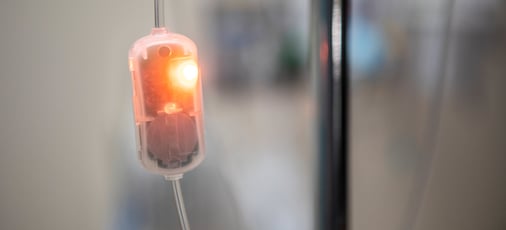The Second Victim: ADEs & Their Impact
WHO IS THE SECOND VICTIM?
Adverse Drug Events (ADEs) can result in traumatizing experiences....

In March of 2022, RaDonda Vaught, a former Vanderbilt University Medical Center nurse, was charged with reckless homicide and abuse of an impaired adult after making a medical error in 2017. Vaught mistakenly administered the wrong medication (vecuronium) that killed an elderly patient.
Flash forward to May, Vaught was granted a judicial diversion. The conviction will be expunged should she complete three years of probation.
Vaught has been removed from the healthcare setting and will never practice nursing again. The judge said, "This was a terrible, terrible mistake and there have been consequences to the defendant."
A Breakdown of the Error
The error occurred when Vaught was searching for a medication that started with “VE.” When nothing came up, she hit an "override" that made other medications available. However, medication like vecuronium should not have been so easily accessible.
According to Vaught in an NPR report, “Overriding was something we did as part of our practice every day. You couldn't get a bag of fluids for a patient without using an override function." Another Vanderbilt nurse testified that “all Vanderbilt nurses were experiencing delays at medication cabinets in late 2017 and that nurses could use overrides to overcome these delays.”
The criminalization of medical errors is having a profoundly alarming effect on the healthcare industry. RaDonda Vaught is a second victim. Rebecca Ray, a nurse who attended the trial, said "Vaught came in innocent and she will leave innocent, no matter what the jury says.”
However, prosecutors concluded that Vaught’s actions went beyond a mistake. Assistant District Attorney Brittani Flatt stated, “RaDonda Vaught probably did not intend to kill [the patient], but she made a knowing choice.” Vaught’s defense argued that while the patient’s death is tragic, and nothing can be done, the circumstances do not make Vaught’s error a conscious, criminal act of homicide. All healthcare providers must be treated fairly when an error occurs. We are human at the end of the day.
When medical errors occur, it’s important for healthcare organizations to upstand a “just culture.” However, in this case, the hospital faced no charges for the patient’s death. Despite a lead investigator claiming that Vanderbilt had a "heavy burden of responsibility,” the hospital did not receive any kind of punishment for the situation.
When the medical error occurred, Vanderbilt took several actions that resulted in the mistake not being disclosed to the government or the public. This can be backed up by the county, state, and federal records related to the patient’s death. Vanderbilt did not end up reporting the error to state or federal regulators — which is required by law. The hospital actually told the local medical examiner’s office that the patient died of “natural causes” with no mention of the medication that caused the death.
Vaught admits to her mistake but insists that it was due to technical issues and flawed procedures at the hospital. But seeing the outcome of the case is causing nurses around the country to wonder, “Could I be next?”
The Impact on Nurses
For more than two years, nurses have been experiencing a severe level of burnout and exhaustion, especially considering all of the pandemic-related stressors they’ve had to endure. Not to mention there have been workforce shortages across the healthcare industry. Many nurses are already leaving the profession due to the emotional toll … And who will want to join a profession if making a mistake can end in losing your license or going to prison?
We can’t just punish our way to safer care. Sending a nurse to prison isn’t going to reduce medical errors. In fact, a non-punitive approach will probably encourage transparency. Nurses will be more likely to report a medical error if they don’t have to fear retribution. The fact that charging a nurse with homicide is a possibility is disconcerting. It should only occur at times when deliberate actions were taken to cause harm.
As stated by the American Nurses Association, “Nurses [have been] watching this case and are rightfully concerned that it will set a dangerous precedent. ANA cautions against accidental medical errors being tried in a court of law.” The statement also read, “ANA believes that the criminalization of medical errors could have a chilling effect on reporting and process improvement.”
The Code of Ethics for Nurses states that while ensuring that nurses are held accountable for individual practice, errors should be corrected or remediated, and disciplinary action taken only if warranted."
The outcome of the Vaught case is troubling to nurses. While she was not found guilty of homicide, in the end, the chance of jail time still looms. This makes nurses wonder whether they should be scared to do their jobs. And it makes other individuals wary of joining the profession. Losing their jobs and never being able to work in the healthcare setting again is a possibility they have to worry about.
When cases like Vaught’s show that hospitals are not being prosecuted, it presents an underlying issue in the industry as a whole. Organizations must make the effort to put the proper practices in place to ensure the highest quality of care.
All medical errors, even small ones, should be analyzed to determine what the exact cause was. That way, healthcare organizations can work to improve processes and help providers avoid mistakes in the future. At MedLite ID, we believe caregivers are heroes. Criminalizing unintentional human errors will not create the better practices of tomorrow. Instead, such efforts would only undercut the real need of learning from these mistakes and promote an environment where they are not talked about. Transparency and learning to be better together are where patient care finds a better tomorrow.

Adverse Drug Events (ADEs) can result in traumatizing experiences....

While America’s healthcare system is no stranger to criticism and you likely already know about its...
Leave a Comment